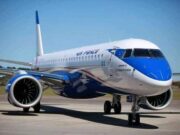…Lists Economic Benefits of Open Skies in Africa
Dr. Richard Aisuebeogun recently at the Walk for Love Africa Summit 2024 highlights Key Steps Forward in Air Transport Liberalization Across Africa with the Theme: “Liberalization of the African Skies:The Way Forward”.
With a burgeoning population exceeding 1.46 billion spread across 54 diverse nations, Africa stands poised for substantial growth in intra-continental air travel.
However, the journey toward realizing this potential is hindered by sluggish liberalization efforts and the prevalence of Bilateral Air Services Agreements (BASAs), coupled with exorbitant taxes and charges on passengers and essential services such as jet fuel.
Initiating the discussion, Dr. Richard Aisuebeogun delved into the critical theme of liberalizing the African Skies, emphasizing the necessity of removing barriers and fostering competition within the continent’s aviation sector.
This entails deregulating air travel, opening new routes, and facilitating the seamless movement of passengers, goods, and services.
In light of the COVID-19 pandemic’s disruptive impact, intra-African air travel experienced a significant setback, with a staggering 66% decline observed in 2020 compared to the previous year.
The need for enhanced air connectivity within Africa and beyond cannot be overstated, particularly given its pivotal role in driving economic activities and fostering trade, tourism, and investment.
Dr. Aisuebeogun shed light on the current status of the Yamoussoukro Decision (YD) implementation, revealing that while progress has been made, many African states still lag in fully embracing its provisions. Compliance assessments uncovered a concerning lack of adherence to essential requirements, impeding the realization of the Single African Air Transport Market (SAATM) and the associated benefits.
According to him, high operating costs, restrictive visa policies, and disparities in liberalization measures pose significant challenges to intra-African connectivity and addressing these obstacles is imperative to foster sustainable growth and ensure widespread accessibility to air travel across the continent.
He outlined key strategies to advance the liberalization agenda, emphasizing the need to eliminate non-physical barriers and enhance regulatory frameworks.
This includes bolstering safety compliance, fostering collaboration among stakeholders, and streamlining institutional regulations to promote fair competition and consumer protection.
Despite the formidable challenges, liberalization promises a host of benefits, including increased air traffic, reduced fare levels, and enhanced connectivity.
Dr. Aisuebeogun underscored the importance of greater collaboration among airlines, advocating for the implementation of liberalized air services and reforms in visa regimes to facilitate market accessibility.
In his concluding remarks, Dr. Aisuebeogun emphasized the urgent need for accelerated infrastructure development, regulatory harmonization, and stakeholder collaboration to unlock Africa’s aviation potential.
With concerted efforts and collective action, liberalization holds the key to fostering inclusive growth, driving economic development, and propelling Africa towards a more connected future.
As Africa navigates the complexities of liberalizing its skies, the journey ahead requires unwavering commitment, collaboration, and innovation to realize the continent’s vast aviation potential and pave the way for a brighter, more interconnected future.




























